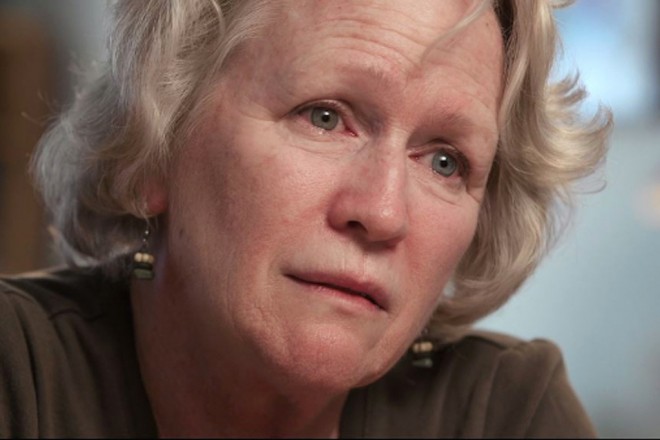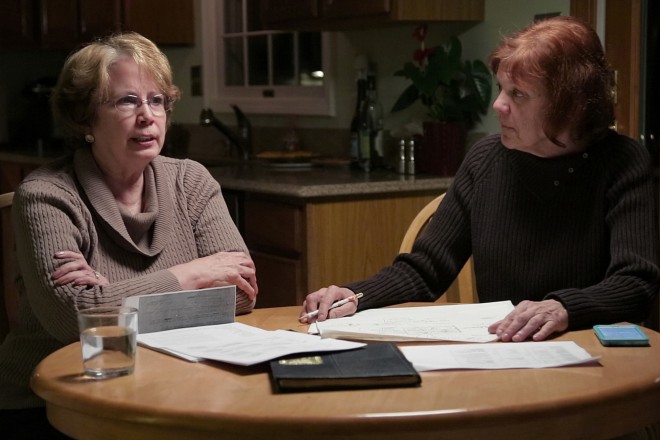‘The Keepers’ Will Make You Totally Re-Think Trauma On TV
Are you ready to talk about The Keepers?

This post discuses violence and sexual assault.
–
If Netflix had a category labelled Trauma – and it surely can’t be far away – The Keepers would be a Top Pick. There’s never been any secret that this, a show about a murdered nun, was full of tragedy. But the sheer scope and depth of that hurt has taken many by surprise.
This is a show primarily about a 26-year-old woman who was abducted and murdered; her head caved in and body left to rot, infested with maggots. The first episode then tells us of a second woman, abducted, killed, and largely forgotten; and their two families who are without answers. This is, ostensibly, our mystery.
But The Keepers, as we go on to learn in six more gut-wrenching instalments, is also a story of rape and assault and psychological torment; of institutional abuse, and men who were given powers to act like gods. It’s a story of women (it is almost exclusively women) who were manipulated and silenced and defeated, by threat or circumstance. The series lets us get to know these survivors, and tracks their pains as it collides with the monolithic structures of the Catholic Church and police.
The tragedy of The Keepers isn’t just in a dead nun and those she left behind. The tragedy is that the documentary barely has a starting point to go off, and often doesn’t know exactly what it’s looking at. How do you hunt for a killer – let alone feel any thrill in the chase – when you’re watching everyone wash someone’s blood off their hands?
Dead Girls and True Crime
Do you remember Serial’s Hae Min Lee? Can you really recall her loves or fears, or her family’s grief when she was killed? What about Making a Murderer’s Teresa Halbach, the Photographer Who Was Happy? The Jinx certainly told us more about Kathleen McCormack, but her story was already on the silver screen – told beneath the rich mania of Ryan Gosling as Robert Durst.
Through all of its impossible tragedies, The Keepers has delivered something that’s been hugely missing in our recent boom of binge-friendly true crime content: a voice for the victim. And, though the series may start with a Dead Woman, Sister Cathy Cesnik is not the only one who has been hurt. She is survived by her sister and former students who passionately relay her character and fight for her justice, and a further group of students embarking on their own battle.
The women re-tell their trauma on their terms, and mourn the violence done to others around them.
After learning about the story from his aunt who attended the school, filmmaker Ryan White sought out a number of women Cathy taught at Archbishop Keough High School who were alleging sexual assault against on-campus priests. There’s a strong suspicion the assaults are linked to Cathy’s murder, but the survivors’ stories aren’t merely used as some lawyer’s courtroom ammunition. They are given space to breathe and evolve; the women re-tell their trauma on their terms, and mourn the violence done to themselves and others.

The most affecting moments come from Jean Wehner — the first of many women to come forward with claims of sexual assault. Jean talks about a priest masturbating as she told him about her uncle’s former abuse, she tells us how another priest forced her to accept his cum into her mouth as the body of Christ. We’re told he raped her, and passed her around to other men (some of whom were allegedly police officers) to be brutalised.
I say all this because Jean does. The details of her sexual assault are her carefully guarded arsenal to be deployed in the fight for justice. They’re not used gratuitously to set the scene in a gnarly episode of SVU or True Detective, while some brooding male cop snarls. We’re asked to stare into Jean’s eyes as she tells her story, and to watch at one point as she pauses, before breaking down in tears. Her head lays on a dining table in a suburban home that probably looks a lot like your mum’s.
Without any ego from the creators, The Keepers reveals in great detail what is really wrought by this violence, and doesn’t offer any mild resolution through a whodunnit solve. Like Making a Murderer and Serial and The Jinx, it interrogates crucial questions about systemic injustice and privilege; but its victims aren’t left silent. They’re still working and crying and fighting like crazy to be heard.
Bingeing Trauma
I watched The Keepers over a few nights with my boyfriend who — speaking of the assault survivors and Cathy, who allegedly knew of the abuse and tried to help — said, “I just can’t believe no one listened to them”. Another tragedy of the series is that I, and so many other women, don’t have trouble believing that at all.
Of course, we all now know of the abhorrent crimes of the Catholic Church in covering up widespread cases of child sex abuse. The violence inflicted on both men and women was enormous, and the refusal to address it is barbaric. But the Church isn’t the only enormous (and patriarchal) structure the women were working against.
The survivors of sexual assault we meet were manipulated and threatened into silence. At one point in the series, so many years later, they are actively dismissed by a former police officer. They are viciously interrogated by defence lawyers and blocked legal recourse to justice at every turn. Despite working so tirelessly to solve Cathy’s murder for more than a decade, the now-retired former students have never been approached by police for information.

At various stages of the series, this seemingly extraordinary story of murder and alleged cover-ups in the Catholic Church, becomes disturbingly ordinary in its details. Women are gaslit and manipulated and overlooked in their homes and schools. Some witnesses mention domestic violence they’ve endured as a brief side-note in a broader story. Do we really need such bludgeoning reminders of how terrible the world can be?
As Anne Helen Peterson recently wrote for BuzzFeed, the biggest joy of this series is the determination and skill of retired lounge-room detectives Gemma Hoskins and Abbie Fitzgerald Schaub.
“They wield skill sets and tools often delegitimised or degraded as feminine,” Peterson wrote. “They strategise on a Facebook group. They file ceaseless requests… They investigate from the soft perches of their desktop computers, firmly ensconced in, but never enclosed by, the domestic sphere. Most importantly, they collaborate with other women — and believe one another. They are women who believe women.”
It’s invigorating to see women band together and overcome but, without any resolution in sight, it’s easy to overwhelmingly feel exhausted from their plight. The emotional heft of The Keepers is something that’s been sorely missing from the true crime genre; if we’re to be immersed in real people’s stories, we should also really feel their pain. But as crucial, thought-provoking and fresh as the show may be, it’s ok if you never, ever want to watch it again.
–
The Keepers is on Netflix now.
–
Meg Watson is the Editor of Junkee. She tweets at @msmegwatson.

